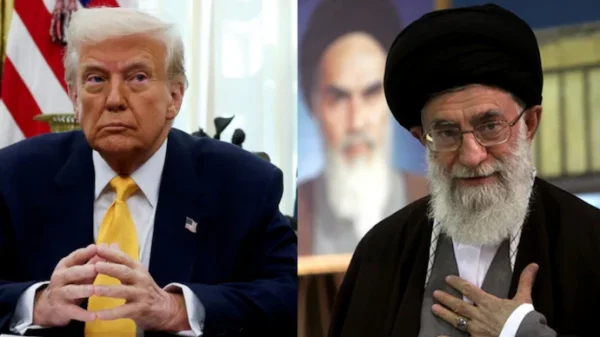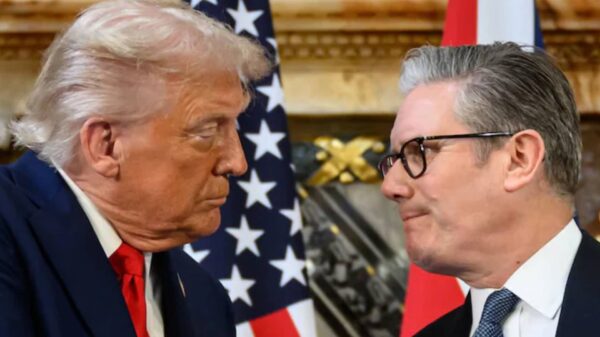A clear majority of the US Supreme Court’s nine justices signaled Thursday, February 8 that they would overturn a Colorado ruling barring former President Donald Trump from the state’s Republican presidential primary ballot.
The former president, and his lawyers were appealing the December 19 decision by Colorado’s Supreme Court that found Trump ineligible for the March 5 GOP contest by virtue of violating the Constitution’s so-called “Insurrection Clause” during the Jan. 6, 2021, Capitol riot.
Trump’s team argued separately that Congress and not the states — was tasked with enforcing the clause, that the provision did not apply to the office of president, and that the 45th president did not engage in an insurrection when hundreds of his allies stormed the Capitol and disrupted the certification of Joe Biden’s 2020 election victory.
The congressional supremacy argument found the most favor with the court, as Chief Justice John Roberts said during oral arguments that upholding the Colorado ruling would open the door to Republican and Democratic states removing politicians of opposing parties from the ballot due to political differences.
“It’ll come down to just a handful of states that are going to decide the presidential election. That’s a pretty daunting consequence,” Roberts said.
“Your Honor, the fact that there are potential frivolous applications of a constitutional provision isn’t a reason,” argued attorney Jason Murray, representing a group of Colorado voters who sought to remove Trump from the ballot.
“The question you have to confront,” liberal Justice Elena Kagan told Murray at another point in his argument, “is why one state should decide who gets to be president of the United States.”
Conservative Justice Samuel Alito asked Murray about a hypothetical in which candidates for “diplomatic reasons think that it’s in the best interests of the” US to send funds to a foreign nation who described Washington as “its biggest enemy” — a clear reference to the Obama-Biden policy toward Iran.
“Could a state determine that that person has given aid and comfort to the enemy, and therefore keep that person off the ballot?” he asked.
Murray contended that a state could not because the Constitution’s language defining treason is precise.
“I think we have to have faith in our system that people will follow their election process processes appropriately,” Shannon Stevenson, Colorado’s solicitor general, replied when presented with a similar question from Alito during her argument.
“I don’t think that this Court should take those threats too seriously,” she added, noting that courts would probvide a safeguard in those scenarios.
The clause in question, Section 3 of the Fourteenth Amendment, stipulates: “No person shall…hold any office, civil or military, under the United States…[who] shall have engaged in insurrection or rebellion against the same, or given aid or comfort to the enemies thereof.”
The clause also allows Congress to remove that “disability” and allow violators back on the ballot. Some of Trump’s allies in Congress have proposed legislation this week formally declaring he did not take part in insurrection.
Liberal justice, Sonia Sotomayor seemed most skeptical of the pro-Trump argument that Congress was the main enforcer of the clause, noting that the Constitution requires a two-thirds majority to remove a disqualification, while Trump attorney Jonathan Mitchell appeared to indicate it would need a simple majority to impose one.
While pointing to the history of states disqualifying candidates, Sotomayor asked whether Mitchell was laying the groundwork for Trump to flout the constitutional requirement that he only serve up to eight years in office.
“Are you setting it up so that if some President runs for a third term, that a state can’t disqualify him from the ballot?” asked the New York jurist.
The Colorado Supreme Court has already ruled that Trump incited the Capitol riot and isn’t eligible to be president again, and as a result, should not be on the state’s primary ballot on March 5.
Trump’s attorney Jonathan Mitchell argued that Congress is tasked with enforcing the disqualification clause, not the states that run elections.
In response to Justice Brett Kavanaugh, Mitchell conceded he would accept the removal of a candidate from the ballot if they were convicted of insurrection.
Supreme Court justices indicate they?ll keep Trump on 2024 ballot in landmark case
“The only caveat I would add is that our client is arguing that he has presidential immunity. So, we would not concede that he can be prosecuted for what he did on January 6th,” Mitchell said.
“What we said in our opening brief was President Trump did not engage in any act that can plausibly be characterized as insurrection,” Mitchell later told Justice Jackson. “For an insurrection, there needs to be an organized concerted effort to overthrow the government of the United States through violence.”
“This was a riot. It was not an insurrection.”
Mitchell further contended that the disqualification clause doesn’t specifically list the president as one of the offices under its purview.
“The President and the Vice President are not specifically listed,” he argued. “That’s why we’re still making the argument that the presidency is excluded from the covered offices that are listed at the beginning.”
Jackson raised concerns about why the president wasn’t listed in the Disqualification Clause during her questioning of Murray.
“Why didn’t they put the word president in the very enumerated list in section three?” she asked. “Doesn’t that at least suggest ambiguity?”
Murray countered that the clause covered the president because it used the phrase, “officer of the United States.”
“Trump’s main argument is that this Court should create a special exemption to section three that would apply to him and to him alone,” he argued. “There is no possible rationale for such an exemption, and the court should reject the claim that the framers made an extraordinary mistake.”
![]()






























































